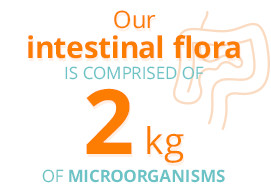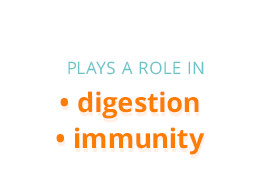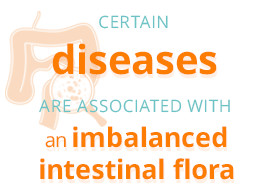The gut-brain connection: What is it and how does it work?
Published May 15, 2021 • By Candice Salomé
Regularly referred to as the "second brain", the intestine plays an active role in both physical and mental health. The gut contains thousands of neurons and is in constant communication with the brain. Until now, scientists thought that this communication was only induced in one direction, from the brain to the intestine. Many researchers and doctors are now trying to demonstrate that this relationship can be established in both directions.
But how does the relationship between the gut and the brain work? What is the gut microbiota and what is its role? What are the consequences of a dysfunctional gut on our health? How can we take care of our gut?
We tell you everything in our article!

What is the gut microbiota?
The intestinal microbiota, commonly referred to as the gut flora, is home to a huge number of micro-organisms: bacteria, viruses, parasites and non-pathogenic fungi.
There are many different microbiota in the body: in the skin, the mouth, the vagina, etc.
The intestinal microbiota is the most important of these with 1,012 to 1,014 micro-organisms: 2 to 10 times more than the number of cells that make up our body, making up about 2 kilos of weight! It is a reservoir of enzymatic activity essential for human digestion and physiology. As such, it influences health.



Source: INSERM
The intestinal microbiota plays a key role in digestion. It breaks down complex foods that our body cannot digest on its own, such as the vegetable fiber contained in fruit, vegetables and cereals, but also pectin and certain starches. Various bacteria intervene in turn and transform them into molecules that are indispensable to humans. Thus, if the diet is not varied and rich enough in fiber, the microbiota loses its own richness.
Moreover, the intestinal microbiota protects the individual against pathogens by "dialoguing" with the immune system. In fact, in a new-born baby, whose immune system is immature, the microbiota, as it gradually settles in, will enable the body to distinguish between microorganisms that can be described as "friendly" and pathogens.
Other research has highlighted the role of the microbiota in other functions of the body: satiety, sensitivity to stress, growth, pain control, etc.
What is the link between the microbiota and certain illnesses?
When the microbiota's composition or function is disturbed, a state of dysbiosis (also called dysbacteriosis) occurs. This can be caused by an antibiotic treatment, for example, but the balance is generally restored fairly quickly.
When the dysbiosis becomes chronic, it may be linked to a health condition such as chronic inflammatory bowel disease (IBD). The microbiota of patients with fewer bacteria could aggravate the condition. The same observation has been made with obesity. Indeed, some patients have a disturbed microbiota with a loss of diversity, an excess of deleterious micro-organisms and/or a deficiency of beneficial micro-organisms.
Why is it said that the gut microbiota is our second brain?
The role of the gut microbiota is not limited to digestion. Numerous studies have shown that it has many links with the brain. A Belgian study, published in the scientific journal Nature Microbiology, suggests that certain types of gut bacteria may have an impact on quality of life and may even be linked to depression.
The gut is home to 200 million neurons that are in constant communication with the neurons in the brain. Intestinal bacteria could therefore influence our behavior (stress, anxiety, depression, etc.) and could also be involved in certain nervous system diseases. Thus, a depressive state could be linked to an imbalance in the intestinal microbiota.
In addition, other studies show that the intestinal flora can play a role in weight and more particularly in the reasons why individuals gain or lose weight.
A number of studies have been carried out on mice. It was found that if the mice were fed bacteria that are common in obese people, they would gain weight. Conversely, when bacteria from slim people were introduced into the diet, the mice lost weight.
Doctors are now trying to determine the true nature of the link between the gut microbiota and the brain.
How to take care of your gut microbiota?
Scientists are considering several therapeutic approaches for diseases triggered or maintained by dysbiosis. They can be implemented alone or in combination and are as follows:
- A diet rich in a variety of fiber, to help rebalance the microbiota.
- Antibiotic treatment targeting harmful bacteria involved in the physiopathology of the disease. This option cannot, however, be considered as a long term treatment option because of the selection pressure it may generate; it could also give rise to new disorders.
- Oral administration of probiotics. Probiotics are living, non-pathogenic micro-organisms and have been shown to be beneficial to the intestinal microbiota.
- Prebiotics, also taken orally. Prebiotics are non-digestible dietary components that are helpful for the activity or growth of certain intestinal bacterial populations.
- Symbiotics, or a combined intake of prebiotics and probiotics for a beneficial synergistic effect.
- Fecal transplantation, which consists of implanting the microbiota of a healthy person, prepared from stool samples, into a sick person via a nasogastric tube or enema (rectal administration). This therapeutic option is already used for severe intestinal infections caused by Clostridium difficile (C. diff colitis).
According to a few studies, the composition of the intestinal microbiota could influence the effectiveness of certain anti-cancer therapies. Indeed, the absence of certain micro-organisms in the microbiota of certain patients could explain why they do not respond to treatment.
This research could open up new diagnostic and therapeutic perspectives by modifying the intestinal microbiota of patients who do not respond well to treatment.
Was this article helpful to you?
Share your thoughts and questions with the community in the comments below!
Take care!
2 comments
You will also like

What are the dangers associated with the over-the-counter sale of certain medicines?
Dec 19, 2020 • 6 comments

 Facebook
Facebook Twitter
Twitter



